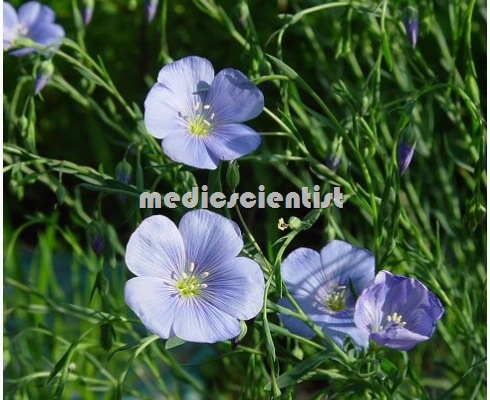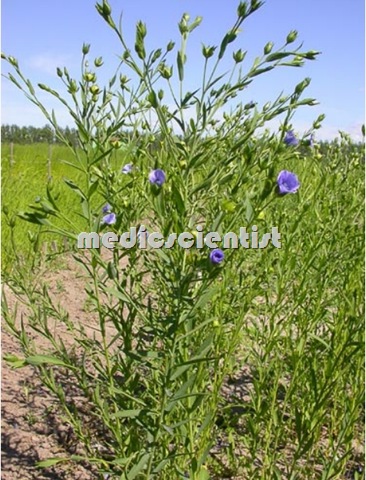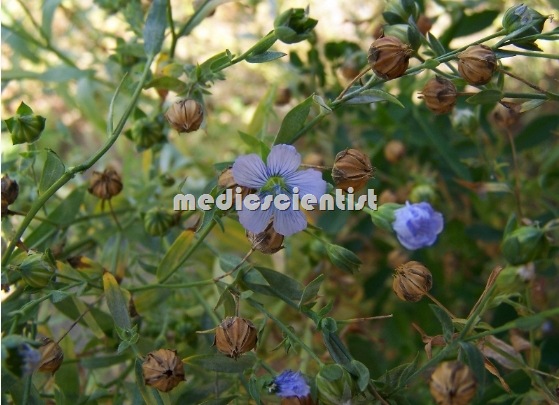Flax Alsi Atasi ATASI (Seed) (binomial name: Linum usitatissimum) (also known as common flax or linseed)
Linseed oil Linum usitatissimum Ayurvedic Medicine of Kustha, Prameha, Flax Alsi Atasi Linum usitatissimum Flax fibers
Atasi consists of dried, ripe seeds of Linum usitatissimum Linn. (Fam. Linaceae), Flax Alsi Atasi Linum usitatissimum Flax fibers are amongst the oldest fiber crops in the world, plains of India up to an altitude of 800 m, capsule ripen by end of June, dried seeds separated from capsule by thrashing.
Scientific classification of Flax Alsi Atasi ATASI
- Kingdom: Plantae
- (unranked): Angiosperms
- (unranked): Eudicots
- (unranked): Rosids
- Order: Malpighiales
- Family: Linaceae
- Genus: Linum
- Species: L. usitatissimum
- Binomial name
- Linum usitatissimum

Flax Alsi Atasi Linum usitatissimum Flax fibers Linseed oil Linum usitatissimum Ayurvedic Medicine of Kustha, Prameha
SYNONYMS of Flax Alsi Atasi ATASI
- Sanskrit : Uma, Ksuma
- Assamese : Tisi, Tusi
- Bengali : Masina, Atasi
- English : Linseed
- Gujrati : Alshi, Arasi
- Hindi : Alsi
- Oriya : Atushi
- Punjabi : Ali
- Tamil : Ali, Virai
- Telugu : Avisa
- Kannada : Agasebeeja, Semeagare, Agasi
- Kashmiri : Alsi
- Malayalam : Agastha, Agasi, Cheru charm
- Marathi : Atshi
- Urdu : Alsi, Katan

Flax Alsi Atasi Linum usitatissimum Flax fibers Linseed oil Linum usitatissimum Ayurvedic Medicine of Kustha, Prameha
DESCRIPTION of Flax Alsi Atasi Linum usitatissimum
- Flax Alsi Atasi Linum usitatissimum flowers are pure pale blue, 15–25 mm diameter, with five petals; they can also be bright red
- abundant globule of fixed oil and occasional starch grains present.
- Transverse section of seed shows testa consists of isodiametric cells with mucilaginous outer walls,
- longitudinally elongated, about 120-190µ long and 14-17 µ wide, thick, aleurone grains in the cotyledons,
- Flax Alsi Atasi Linum usitatissimum fruit is a round, dry capsule 5–9 mm diameter, containing several glossy brown seeds shaped like an apple pip, 4–7 mm long.
- upto 20 µ in diameter, each with globoid and crystalloid,
- lignified and with pitted walls, single layer of flattened polygonal pigment cells with reddish-brown contents,
- collenchymatous cells of middle layer of seed coat cylindrical, single layered, yellowish brown,
- Flax is an erect annual plant growing to 1.2 m (3 ft 11 in) tall, with slender stems.
- a light depression enclosing hilum and micropyle, embryo consisting of two yellowish-white, flattened planoconvex cotyledons and a radicle,
- Flax Alsi Atasi Linum usitatissimum leaves are glaucous green, slender lanceolate, 20–40 mm long and 3 mm broad.
- Seed small, brown, glossy with minutely pitted surface, about 4-6 mm long and 2-2.5 mm in maximum width,
- Flax Alsi Atasi ATASI testa mucilaginous when soaked in water, odour, characteristic, taste, oily when chewed.
- elongated-ovoid, flattened, rounded at one end and obliquely pointed at the other, near which on one edge,
- nearly fills the seed and completely surrounded by a thin, whitish endosperm, both endosperm and embryo oily,

Flax Alsi Atasi Linum usitatissimum Flax fibers Linseed oil Linum usitatissimum Ayurvedic Medicine of Kustha, Prameha
Uses
- Flax is grown both for its seeds and for its fibers.
- Various parts of the Flax Alsi Atasi ATASI plant have been used to make fabric, dye, paper, medicines, fishing nets, hair gels, and soap
IDENTITY, PURITY AND STRENGTH
CONSTITUENTS –
- Fixed oil,
- mucilage and protein
PROPERTIES AND ACTION of Flax Alsi Atasi Linum usitatissimum
- Rasa : Madhura, Tikta
- Guna : Snigdha, Guru
- Virya : Ushna
- Vipaka : Katu
- Karma : Vataghna, akshuruksha,
IMPORTANT FORMULATIONS –
- Sarasapidi Pralepa
THERAPEUTIC USES Ayurvedic Medicine –
- Kustha,
- Prameha
- Siroroga,
- Kremiroga,
DOSE Ayurveda drugs –
- 3-6 g of the drug in powder form


